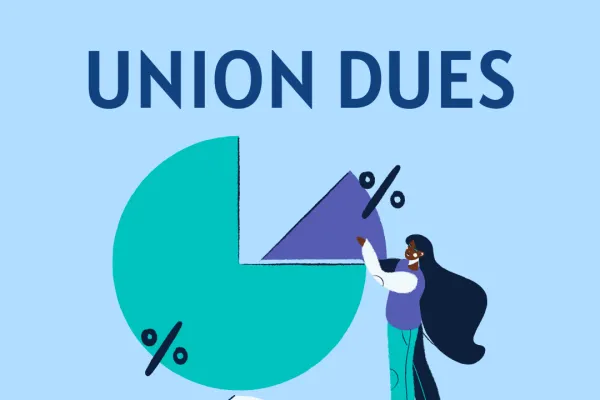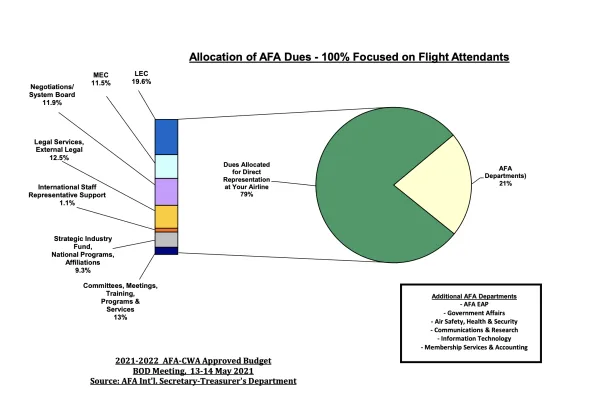Union Dues

The payment of union dues is something that crew often have questions about. They want to know about whether or not it's mandatory, where the money goes and what is being done for them with it.
These are all valid questions, and crew members have a right to access this information. Read on below to find out.
Do I Have To Pay My Union Dues?
Yes. All members of the union MUST pay dues to be considered a Member in Good Standing.
Where Do Our Dues Go?
Our dues are used in Funding Flight Attendant Priorities.
The Dues Pie Chart depicts where all funds at AFA are budgeted.

About 80% of dues dollars are directly allocated to fund the work at each airline, ie. Local Councils, Master Executive Councils, Negotiations, and System Board. The remaining budgets at the International Office support Government Affairs, Air Safety, EAP, and Communications Departments, each of which provides expert services that are Flight Attendant focused and provide resources for the local leaders and committees of Flight Attendants at each airline. 100% of our dues dollars are allocated to priorities that provide Flight Attendant representation. There are four distinct areas where dues money is spent:
1. Locally and Airline-wide
Each base has a Local Executive Council (LEC) with elected Officers who provide direct representation and deal with local grievances and other issues. These Local Officers will answer your phone calls and make sure member interests are represented in front of management. For example, in the event of discipline or a contract violation, Local Officers will address the issue where it happened and work to get swift resolution. Additionally, elected Master Executive Council (MEC) Officers provide representation at the corporate level. At both the LEC and MEC, there are committees that solve problems in areas such as safety, schedules, hotels, grievances, etc. These committees also enforce the contract specific to their area of expertise, produce newsletters, and participate in union meetings. The role of your LEC and MEC Officers and committee representatives at each airline is to ensure you are represented by Flight Attendants who know your job because they share it with you at your airline. AFA promotes this autonomy at each airline where your representatives, assisted by experts, negotiate with management and develop and maintain the relationship between airline management and the Union.
2. Negotiations
Bargaining for pay and working conditions is one of the core representation activities performed by the Union. We start with a membership survey, schedule meetings with management, conduct caucuses with the committee, develop contractual language, support membership engagement and information programs, and we work with AFA-CWA professional negotiators throughout the process including all direct negotiations/mediation with management. The end result is improved contractual language with higher pay, better working conditions, and improved benefits.
3. System Board (Grievances)
The first step in any grievance is to try to resolve the matter locally. Some airlines have negotiated an alternative dispute process for a faster, collaborative resolution. If that fails, then the final stage for resolution, whether disciplinary or contractual, is an appeal to a neutral arbitrator. An AFAâ€CWA attorney will work with our Grievance Committee to present our case to the neutral arbitrator. We defend the contracts we negotiate.
4. International Office Support
While your LEC is the face of the Union to local management and the MEC to corporate management, the International Office is the public persona and brand of the Union. Our presence and name recognition can legislate or improve federal regulations, remove obstacles from the bargaining table, better our position in negotiations and improve our experience on the job across the profession. The International Office maintains the professional staff of attorneys, negotiators, and other personnel that provide administration, accounting and membership services to members and elected leaders. We all work together to support the programs that encompasses our profession.
What Happens If I Don't Pay My Dues?
Continuous non-payment of dues could lead to termination of your employment with Norse. Please see detailed information about member standing and the consequences of non-payment of dues HERE
How Do I Pay My Union Dues?
If you have filled out a dues authorization form and mailed it in to AFA, you should have $50 a month, or $25 per pay period, being deducted from your paycheck. You can find this form HERE
If this is not occurring and you have received a bill in saying that you owe money, you can contact AFA Membership Services and pay the balance online at https://unionly.io/o/afacwa/dues
If you have any further questions about union dues, don't hesitate to reach out to your MEC at [email protected].
Do I Owe Dues While I'm On Leave?
The #1 Most Asked Question.
The answer depends on several things. First of all in accordance with the AFA-CWA Constitution & Bylaws every flight attendant on a leave of absence owes dues for the first 3 months of their leave of absence AFTER their compensation from their airline ends. Compensation means utilizing any sick time or vacation time at the commencement of your leave of absence. Those flight attendants on a military leave or involuntary furlough do not owe these dues.
This is part of the AFA-CWA Constitution & Bylaws:
"Payment of dues shall be required of all members that are on active status during a month or any portion thereof. A member is responsible for dues payments for the first ninety (90) days of any unpaid leave and who is no longer receiving compensation through the carrier. This compensation includes, but is not limited to, contractually negotiated sick leave, vacation, or disability. If a member is on a leave of absence for a full month or longer due to military service and is no longer receiving compensation through a carrier, that member will not be required to continue payment of dues"
*The Constitution and Bylaws is written by the AFA Board of Directors which consists of all LEC Presidents, including yours.
Example of the 90-day leave obligation:
On January 1, a flight attendant breaks their leg skiing, they are not scheduled to return until September. They have enough time in the sick bank to pay themselves for the month of January and February (paid leave of absence). Their 90-day leave obligation (unpaid leave) would be: March, April and May. They would not owe for the remainder of their leave of absence and upon return to active status the payroll deduction of dues would resume.
I am on a voluntary furlough, do I owe the 90-day leave obligation?
Yes. The AFA Membership Services Department receives this information from the AFA leaders at your airline. The AFA-CWA database is coded so you are only billed for these 3 months and then the billing stops.
Example of the 90-day leave obligation:
Your voluntary furlough begins on November 1. You would owe dues for November, December and January. If dues are payroll deducted for any of these months, it will be applied to this 90-day leave obligation.
You have 3 options for handling this obligation.
- Make the payment (www.afacwa.org/payment)
- Set up a payment plan. See Payment Options
- Ask for a dues deferral
A dues deferral is only available for flight attendants on an unpaid leave of absence.
This deferral moves your obligation to the point in time when you return to active flying. If you are in a financial hardship while on unpaid leave (ex: medical) you may call the AFA-CWA Membership Services Department and ask for the deferral letter.
AFA will send the deferral letter to the member. It is up to the member to sign and return the letter to AFA Membership Services
Once the signed application is received, your account status will be updated and you will not be billed until you return to work.
See more frequently asked questions about union dues HERE
